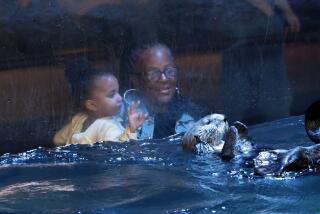Clever trout rival chimpanzees at choosing good allies, study finds
Don’t play games with the coral trout – it might just outmaneuver you. These fish appear to be just as skilled as chimpanzees at picking the best, most able allies to help them nab some food, new research shows.
The findings, described in Current Biology, show that fish may have remarkable cognitive abilities that are usually assigned to warm-blooded, bigger-brained species -- including humans.
Various fish species are impressive critters in their own right – some have been shown to walk better when raised on land; others can shoot down their prey by spitting jets of water. But cooperation -- and choosing the best candidate for the job -- is one trait that seems to set humans and certain animals such as chimpanzees apart from the rest of the animal kingdom.
The coral trout, however, also seems to possess an understanding of cooperation to the point that it actually collaborates with other species. This trout, of the genus Plectropomus, can easily hunt down smaller fish as it swims over coral reefs, but it can’t follow its prey into the nooks and crannies within the reef itself. That’s not a problem for the moray eel, whose snaky body can easily slip into these holes.
So the coral trout actually do something incredible: They recruit the moray eel by pointing it in the direction of the hidden fish. They use head shakes and headstands to show the moray eel where to go and flush the fish out.
But could these fish, like chimpanzees or humans, actually pick collaborators who are better than others? It would certainly pay to do so, the authors point out, because not all moray eels are team players.
“Field observations suggest that individual morays differ consistently in their willingness to collaborate,” the study authors wrote, “and trout should benefit from preferentially recruiting these individuals.”
To find out, researchers led by Alexander Vail of Cambridge University in England set up a behavioral experiment with fish that almost exactly mirrored a 2006 study of chimpanzees’ partner preferences. In that experiment, the chimps could see some food on a plank outside their cage, with rope within reach. Depending on the rope’s position, sometimes pulling in the food-laden plank was a solo endeavor; other times it was a two-chimp job.
To mirror those experiments, the fish-testers first set up an experiment where the the prey was in the open, or in a crevice – and the trout had to decide whether getting a meal was worth cooperating with a fake eel, conveniently positioned nearby. The scientists found that the trout made the right choice (collaborate if the fish is hiding; go solo if it’s out in the open) at roughly the same rate as the chimps did in the 2006 experiment.
Then the scientists upped the ante. The researchers made some of their fake moray eels act as good collaborators (go for the fish) and as bad collaborators (swim away). Sure enough, the trout soon learned to pick the more helpful eels – and again, at about the same rate as the chimpanzees did in the 2006 experiment.
“Our study thus strengthens the case that a relatively small brain (compared to warm-blooded species) does not preclude at least some fish species from possessing cognitive abilities that compare to or surpass those of apes,” the researchers wrote, “provided that the situation is ecologically relevant to them.”
Chimps are often thought to share complex behaviors – such as choosing allies wisely – because they share a common lineage with humans and other apes. They’re also very intelligent, which isn’t a quality typically attributed to fish. But the new research hints that maybe cooperation just crops up in many different lineages whenever it is useful. That’s a phenomenon known as convergent evolution, which is why dolphins and sharks have similar body plans even though they have completely different origins.
“The processes that underlie superficially similar cognitive abilities may vary widely among taxa,” the study authors wrote. In other words, these fish findings could hint that chimpanzee collaboration might not be as similar to human collaboration as scientists may have thought.
Fascinated? Follow @aminawrite for more weird science news from the animal kingdom.







